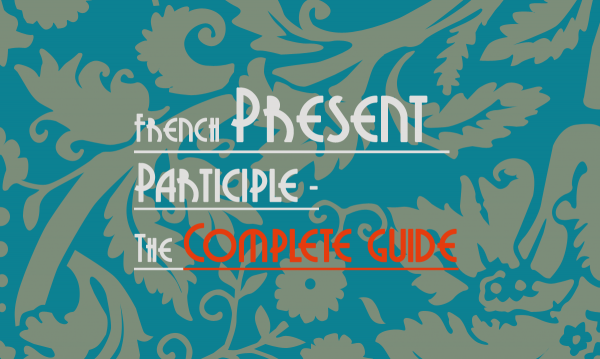Before we go any further with this, let's try to address this question that I'm pretty sure is in your mind right now.

Why we should learn the French present participle?
The French participe présent does not form any tense itself, that's why it is far less common than its English counterpart, and even less common than its brother participe passé. But without this little thing, the French language will no longer be the same.
They say that the forgotten one, if it does not want to be forgotten, it should act strong and be flexible. This is undoubtedly true for the case of the French participe présent here. This participle could be used either as a gerund, a noun, a verb or an adjective. Employing it properly will make your sentence light but beautiful.
Ready to start learning about it? Let's go and learn about participe present French!
First problem: How to form a present participle in French
Some of you may already know the rule to form the present participle of a verb, but let's review it one more time here.
The good news is that the rule is pretty straightforward and there are very few exceptions. For regular and all but three irregular verbs, the present participle is formed by dropping -ons from the form of the first person in plural (nous) of the present tense and adding -ant.
| Manger | -> Nous mangeons | -> mangeant |
| Parler | -> Nous parlons | -> parlant |
| Finir | -> Nous finissons | -> finissant |
| Sortir | -> Nous sortons | -> sortant |
We have only 3 exceptions, 2 of them are verbs that always appear in the list of exceptions for all tenses in French: avoir et être. The 3rd one is also a well-known verb: savoir (to know).
| avoir | -> ayant |
| être | -> étant |
| savoir | -> sachant |

Speak, Listen, and Write French like a Native with Talk in French Complete Courses
When you SHOULDN'T use the French Present Participle
So, when SHOULD you use it?
It might not catch your eye at the first sign, but the French present participle could be found in many sentence structures, as detailed below:
| Il s'est foulé la cheville en jouant au foot (cause) | He sprained his ankle while playing football. |
| Elle écoute la musique en conduisant (simultaneity) | She listens to music while driving |
Example:
Without present participle: Il n'a pas pu jouer parce qu'il est blessé au genou. (subordinating conjunction) He couldn't play because he has a knee injury
With present participle: Étant blessé au genou, il n'a pas pu jouer. (present participle) Having a knee injury, he couldn't play.
| un gagnant | a winner | une gagnante | a winner (feminine) |
| un perdant | a loser | une perdante | a loser (feminine) |
| un assistant | an assistant | une assistante | an assistant (feminine) |
| un commerçant | a shopkeeper | une commerçante | a shopkeeper (feminine) |
| un enseignant | a teacher | une enseignante | a teacher (feminine) |
| un étudiant | a student | une étudiante | a student (feminine) |
| un fabricant | a manufacturer | une fabricante | a manufacturer (feminine) |
des matchs épuisants exhausting games
un sport exigeant a demanding sport
This is formed with the auxiliary avoir/être in present participle mood + the past participle of the verb (similar to the passé composé).
Example:
Ayant accepté la défaite, les joueurs sont rentrés chez eux.
Having accepted the defeat, the players went home.
The rule of choosing the auxiliary (avoir/être) is similar to other compound tense in French (e.g: passé composé).
This structure is used to describe an action that took place right before another action. It is nearly similar to the structure après avoir/ être + participe passé
Quick Recap
I hope you found this article about French participe present helpful and I am looking forward to your comments.
If you want more simplified (and not boring) grammar lessons, check out the French Vocabulary Mastery Course.

Speak, Listen, and Write French like a Native with Talk in French Complete Courses
P.S. You would be doing me a HUGE FAVOR by sharing it via Twitter or Facebook.
Here are some FAQs about French Present Participle
How do you form the present participle in French?
It is relatively simple: take the present tense verb for first person plural (nous), drop the -ons and replace with -ant. For example, nous mangeons becomes mangeant.
The 3 exceptions to this rule are avoir as ayant, être as étant, and savoir as sachant.
What is an example of a present participle in French?
Sachant le danger, je n’y suis pas allé.
Knowing the danger, I didn’t go.
What is the gerund in French?
The French gérondif is used with the present participle to describe the relationship between two actions. This is done by adding en before the present participle.
When should you not use the French present participle?
You cannot use it like the English present continuous to emphasize an ongoing action. For example, “I am doing” cannot be replaced with literally “je suis faisant.” You have to use the French present tense je fais.
You also cannot use it right after a verb. “I like playing sports” cannot be translated to “j’aime faisant du sport.” The correct form is to use the infinitive: jáime faire du sport.

[…] Even less common than its English counterpart present participle (V+ing), the French's participe present still have an irreplaceable place in French's sentence structure, as you will see in this article. […]
Salut! Je vous écris du Mexique, je suis prof (et même étudiante) de Fraçais au collège et au lycée et j’utilise vos articles pour mes classes. Aussi je récommend mes élèves les vidéos d’Imagiéres. Merci beaucoup por tout le matériaux!
:0)
Maricarmen
I found that article really interesting and well explained. Thankyou. now I just have to try to use it!
Excellent review! I had all but forgotten the use of the present participle. Thank you for sharing this!
Merci Michel
extremely helpful – I had been wondering about this very thing!
Salut Frederic,
Je suis enseignant de francais en Inde, je viens de m’abbonner sur votre site et j’ai parcouru le lecon sur le participe present et je trouve cela vraiment utile. Merci beaucoup
C’est bien expliqué et ça m’a beaucoup aidé, merci beaucoup ☺️